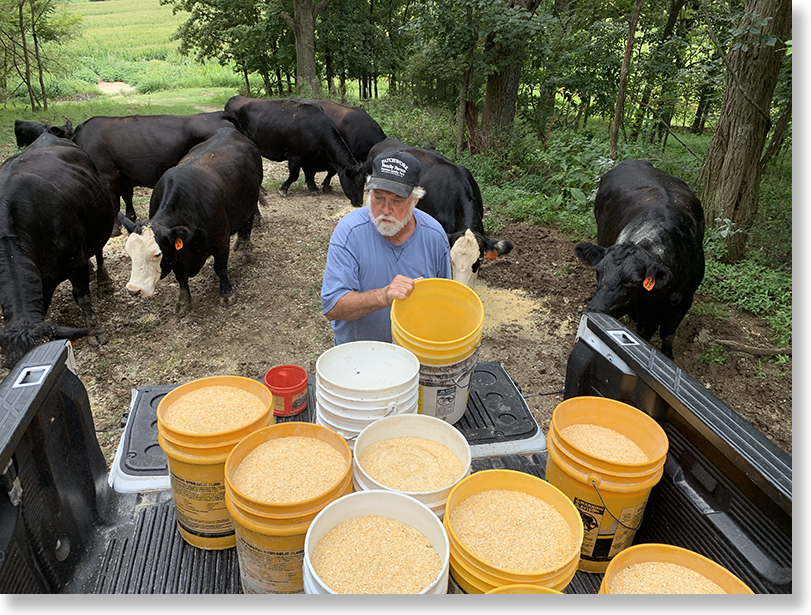|
Family Farms Are The Solution,
Corporate Agriculture Is The Problem by Tim Gibbons Columbia, Missouri |
||||
Last month, Missouri Rural Crisis Center held a telephone town-hall with thousands of Missourians across our state. The conversation focused on how we can work together to stop foreign corporate ownership of Missouri farmland, which is an important task we have to undertake. But, foreign corporate ownership of Missouri farmland is a symptom of an even larger challenge we are facing -- the corporate, multinational takeover of our farm and food system. Over the last 30 years, we’ve witnessed corporations seizing entire industries through concentration, mergers, industrialization, and vertical integration. This type of monopolistic control of our markets and food system puts family farmers out of business, pushes people off the land, extracts vast wealth from our communities, pollutes our air and water, and threatens our national security. This isn’t just talk. For example, the independent production of hogs in Missouri and across our country was a huge economic driver in our rural communities and economies. And, because of corporate control, in nearly one generation, 90% of Missouri’s hog producers were put out of business, from 23,000 in the mid-80’s to only 2,600 now. That’s also generations of animal husbandry lost. Fifty percent of the pork in the U.S. is controlled by two foreign corporations, Smithfield from China and JBS from Brazil. JBS is also the biggest beef packer in the world, and owns Pilgrim’s Pride Poultry. The seed industry is controlled by just thee giant corporations: Monsanto/Bayer is a German corporation, ChemChina/Syngenta is a Chinese corporation and Dow/Dupont, which is from the U.S. The corporate narrative continually tells us that this happened, and is happening, because it’s inevitable. Because they are more efficient. We know that’s not the truth. The truth is, our food system has been captured by just a few multinational corporations because of bad policies, that corporate lobbyists and campaign contributions have promoted and made law; and a scarcity of good policies. Right now, our laws and policies are largely working against the vast majority of us. And, we saw during this global pandemic, that centralized control of our food system is more dangerous than we even knew. The recent disruptions, especially in the meat supply chain, offer a vivid example of how excessive corporate control has made our food system less resilient. Farmers, consumers and our communities suffered, while corporations profited. We need to go in a different direction, and we need different policies that support family farmers and consumers, our rural communities and economies, a safe, decentralized food system and a democratic process that truly reflects our values. We need Congress to pass policies that create open, fair and competitive livestock and commodity markets. We need to enforce antitrust laws and stop corporate mergers that concentrate markets even more. We need our public taxpayer dollars to stop fueling the industrialization, monopolization and foreign corporate control of our food and markets. We need USDA’s conservation and guaranteed loan programs to support family farms, not factory farms. We need country of origin labeling so consumers can choose U.S. produced meat over foreign imports. With the current debate on how to fix climate change going on right now, we need diversification and family farms to be the solution, not corporate carbon banks and taxpayer-funded factory farm methane digesters. A food and farm system that sustains family farms and promotes the next generation of family farming is the best way to revitalize rural communities, produce a healthy and sustainable food supply, and respond to climate change. Climate policy for agriculture must ensure competitive markets that provide a fair price for farmers and a fair wage for workers. There are some bills introduced in Congress that would address these issues, like the “Food and Agribusiness Merger Moratorium and Antitrust Review Act” sponsored by Sen. Cory Booker. Also Sens. Charles Grassley and John Tester’s “Spot Market” bill that would foster more competitive and transparent markets and require large meatpackers to buy 50% of the animals they process from the spot market and have to slaughter them within 14 days. We need policies that help independent production of cattle stay viable, and to stop the cattle industry from going the way of hogs. This is the type of legislation we are demanding and we need. Our fight for democracy is at risk. For democracy to be real, we need competition and diversity in production, processing and distribution. We need diverse land ownership, with millions of family farms and rural landowners on the land. We need power in the hands of the people, not a few absentee, multinational corporations. We need our system and our elected representatives to actually represent us, their constituents, and not special interests. About the author: Tim Gibbons is communications director for the Missouri Rural Crisis Center, a statewide farm and rural organization dedicated to preserving family farms and promoting stewardship of the land and environmental integrity. Also see:
|
||||
|
Published in In Motion Magazine May 29, 2021 |
||||
If you have any thoughts on this or would like to contribute to an ongoing discussion in the  What is New? || Affirmative Action || Art Changes || Autonomy: Chiapas - California || Community Images || Education Rights || E-mail, Opinions and Discussion || En español || Essays from Ireland || Global Eyes || Healthcare || Human Rights/Civil Rights || Piri Thomas || Photo of the Week || QA: Interviews || Region || Rural America || Search || Donate || To be notified of new articles || Survey || In Motion Magazine's Store || In Motion Magazine Staff || In Unity Book of Photos || Links Around The World NPC Productions Copyright © 1995-2021 NPC Productions as a compilation. All Rights Reserved. |


